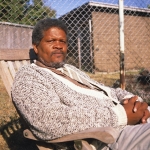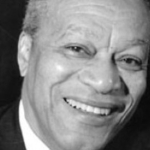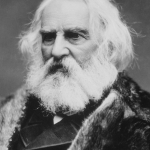TO MRS. FRY IN NEWGATE
Sermons in stones.—As You Like It.
Out! out! damned spot.—Macbeth.
Sermons in stones.—As You Like It.
Out! out! damned spot.—Macbeth.
I like you, Mrs. Fry! I like your name!
It speaks the very warmth you feel in pressing
In daily act round Charity’s great flame—
I like the crisp Browne way you have of dressing,
Good Mrs. Fry! I like the placid claim
You make to Christianity,—professing
Love, and good works—of course you buy of Barton,
Beside the young fry’s bookseller, friend Darton!
I like, good Mrs. Fry, your brethren mute—
Those serious, solemn gentlemen that sport—
I should have said, that wear, the sober suit
Shap’d like a court dress—but for heaven’s court.
I like your sisters too,—sweet Rachel’s fruit—
Protestant nuns! I like their stiff support
Of virtue—and I like to see them clad
With such a difference—just like good from bad!
I like the sober colors—not the wet;
Those gaudy manufactures of the rainbow—
Green, orange, crimson, purple, violet—
In which the fair, the flirting, and the vain, go—
The others are a chaste, severer set,
In which the good, the pious, and the plain, go—
They’re moral standards, to know Christians by—
In short, they are your colours, Mrs. Fry!
As for the naughty tinges of the prism—
Crimson’s the cruel uniform of war—
Blue—hue of brimstone! minds no catechism;
And green is young and gay—not noted for
Goodness, or gravity, or quietism,
Till it is sadden’d down to tea-green, or
Olive—and purple’s giv’n to wine, I guess;
And yellow is a convict by its dress!
They’re all the devil’s liveries, that men
And women wear in servitude to sin—
But how will they come off, poor motleys, when
Sin’s wages are paid down, and they stand in
The Evil presence? You and I know, then,
How all the party colours will begin
To part—the Pittite hues will sadden there,
Whereas the Foxite shades will all show fair!
Witness their goodly labors one by one!
Russet makes garments for the needy poor—
Dove-colour preaches love to all—and dun
Calls every day at Charity’s street door—
Brown studies scripture, and bids woman shun
All gaudy furnishing—olive doth pour
Oil into wounds: and drab and slate supply
Scholar and book in Newgate, Mrs. Fry!
Well! heaven forbid that I should discommend
The gratis, charitable, jail-endeavor!
When all persuasions in your praises blend—
The Methodist’s creed and cry are, Fry for ever!
No—I will be your friend—and, like a friend,
Point out your very worst defect—Nay, never
Start at that word!—But I must ask you why
You keep your school in Newgate, Mrs. Fry?
Too well I know the price our mother Eve
Paid for her schooling: but must all her daughters
Commit a petty larceny, and thieve—
Pay down a crime for “entrance” to your “quarters”?
Your classes may increase, but I must grieve
Over your pupils at their bread and waters!
Oh, tho’ it cost you rent—(and rooms run high)
Keep your school out of Newgate, Mrs. Fry!
O save the vulgar soul before it’s spoil’d!
Set up your mounted sign without the gate—
And there inform the mind before ’tis soil’d!
’Tis sorry writing on a greasy slate!
Nay, if you would not have your labors foil’d,
Take it inclining tow’rds a virtuous state,
Not prostrate and laid flat—else, woman meek!
The upright pencil will but hop and shriek!
Ah, who can tell how hard it is to drain
The evil spirit from the heart it preys in,—
To bring sobriety to life again,
Chok’d with the vile Anacreontic raisin,—
To wash Black Betty when her black’s ingrain,—
To stick a moral lacquer on Moll Brazen,
Of Suky Tawdry’s habits to deprive her;
To tame the wild-fowl-ways of Jenny Diver!
Ah, who can tell how hard it is to teach
Miss Nancy Dawson on her bed of straw—
To make Long Sal sew up the endless breach
She made in manners—to write heaven’s own law
On hearts of granite.—Nay, how hard to preach,
In cells, that are not memory’s—to draw
The moral thread, thro’ the immoral eye
Of blunt Whitechapel natures, Mrs. Fry!
In vain you teach them baby-work within:
’Tis but a clumsy botchery of crime;
’Tis but a tedious darning of old sin—
Come out yourself, and stitch up souls in time—
It is too late for scouring to begin
When virtue’s ravell’d out, when all the prime
Is worn away, and nothing sound remains;
You’ll fret the fabric out before the stains!
I like your chocolate, good Mistress Fry!
I like your cookery in every way;
I like your shrove-tide service and supply;
I like to hear your sweet Pandeans play;
I like the pity in your full-brimm’d eye;
I like your carriage, and your silken grey,
Your dove-like habits, and your silent preaching;
But I don’t like your Newgatory teaching.
Come out of Newgate, Mrs. Fry! Repair
Abroad, and find your pupils in the streets.
O, come abroad into the wholesome air,
And take your moral place, before Sin seats
Her wicked self in the Professor’s chair.
Suppose some morals raw! the true receipt’s
To dress them in the pan, but do not try
To cook them in the fire, good Mrs. Fry!
Put on your decent bonnet, and come out!
Good lack! the ancients did not set up schools
In jail—but at the Porch! hinting, no doubt,
That Vice should have a lesson in the rules
Before ’twas whipt by law.—O come about,
Good Mrs. Fry! and set up forms and stools
All down the Old Bailey, and thro’ Newgate-street,
But not in Mr. Wontner’s proper seat!
Teach Lady Barrymore, if, teaching, you
That peerless Peeress can absolve from dolour;
Teach her it is not virtue to pursue
Ruin of blue, or any other colour;
Teach her it is not Virtue’s crown to rue,
Month after month, the unpaid drunken dollar;
Teach her that “flooring Charleys” is a game
Unworthy one that bears a Christian name.
O come and teach our children—that ar’n’t ours—
That heaven’s straight pathway is a narrow way,
Not Broad St. Giles’s, where fierce Sin devours
children, like Time—or rather they both prey
On youth together—meanwhile Newgate low’rs
Ev’n like a black cloud at the close of day,
To shut them out from any more blue sky:
Think of these hopeless wretches, Mrs. Fry!
You are not nice—go into their retreats,
And make them Quakers, if you will.—’Twere best
They wore straight collars, and their shirts sans pleats;
That they had hats with brims,—that they were drest
In garbs without lappels—than shame the streets
With so much raggedness.—You may invest
Much cash this way—but it will cost its price,
To give a good, round, real cheque to Vice!
In brief,—oh teach the child its moral rote,
Not in the way from which it won’t depart,—
But out—out—out! Oh, bid it walk remote!
And if the skies are clos’d against the smart,
Ev’n let him wear the single-breasted coat,
For that ensureth singleness of heart.—
Do what you will, his every want supply,
Keep him—but out of Newgate, Mrs. Fry!


















Comment form: